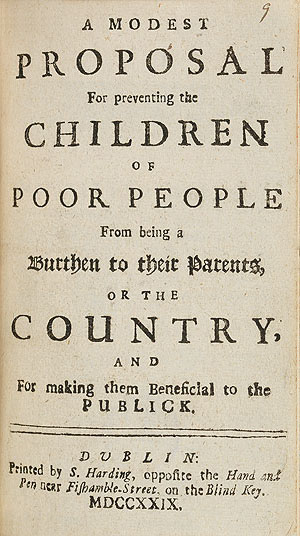 I’ve been thinking, and yes, that’s a dangerous thing.
I’ve been thinking, and yes, that’s a dangerous thing.
The reason I’ve been thinking about this particular subject will become clear here over the next week or so, but for now I’d like to throw the floor open for discussion. The topic: Irish satire and satirists.
When you think of satire among Irish writers, who springs to mind?
Jonathan Swift, of course, is the grand-daddy of them all, with works such as Gulliver’s Travels and A Modest Proposal possessing a reach far greater than the number of people who’ve actually read them. Gulliver the written work is dense and difficult in parts, but Gulliver the movie persona is famous the world over through Ted Danson, Jack Black and others.
Who else? Brian O’Nolan/Flann O’Brien/Myles na gCopaleen, absolutely, but I’m of a different generation than that which enjoyed a regular diet of Flann O’Brien, Donal Foley’s “Man Bites Dog” columns in the Irish Times and Hall’s Pictorial Weekly on RTÉ.
Later, as satire increasingly found a natural home in radio and TV, the likes of Dermot Morgan, Gerry Stembridge, Arthur Matthews and Graham Linehan rose to prominence through the vehicle of satire.
Aprés Match (Barry Murphy, Risteard Cooper and Gary Cooke) is a staple of satirical comedy in Ireland, and Pictorial Weekly was revived by Murphy.
Mario Rosenstock took inspiration from Scrap Saturday and ran with it, and Oliver Callan crested that wave to become a household name too; no recent satire has been as scathing as that of David McSavage’s The Savage Eye; the Rubberbandits have taken Irish satire to MTV.
But back to where I started.
Is Irish satire now restricted to the airwaves alone?
Or are there practitioners at work in written form too?
Satire, these days if not in the past, must be a little more subtle when it appears in written form. Rosenstock, Callan, McSavage et al can take a baseball bat to the mores of society and it’s a roaring success; the same approach in a short story, say, would be far too heavy-handed.
Kevin Barry is one Irish writer who readily springs to mind (well, this mind at least). His “The Fjord of Killary”, first published in The New Yorker three years ago and subsequently collected in his Dark Lies The Island last year, fitted the pigeon-hole of satire more than anything else; “Supper Club”, the opening story in the recent Silver Threads of Hope charity anthology, was an even more blatantly satirical riff on the excesses of Celtic Tiger Ireland. Barry himself described Gavin Corbett’s recent novel This Is The Way as a satire.
So past or present, who’s your favourite Irish satirical writer? And who might have been overlooked but deserves to stand on the same stage?
Let me know in the comments.
Shane
Update: I asked the question on Twitter earlier and among several interesting responses came these from “anonymous writer/director” ManintheBlackPyjamas:
[tweet 334317608973254656 hide_thread=’true’]
[tweet 334318036196659200 hide_thread=’true’]
[tweet 334319009824649216 hide_thread=’true’]






